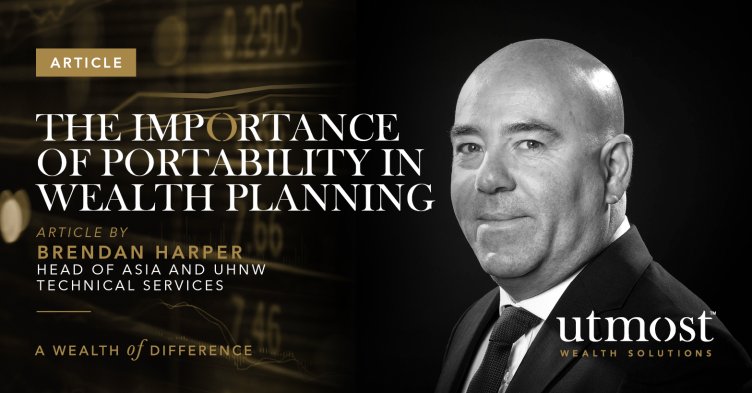The importance of portability in wealth planning

Brendan Harper | Head of Asia and UHNW Technical Services | Utmost Wealth Solutions
In my experience of dealing with globally mobile clients, a major challenge is the classification of assets and the structures that have been put in place whilst they were based in one country and they subsequently move to another. Even very simple structures, such as a pension or a mutual fund, may not fit easily into local regulatory or tax definitions, which can vary from one country to another. This creates issues with recognition and qualification.
For more complex structures, there may be anti-roll-up rules that seek to look through investment holding structures in order to tax the underlying income and gains on the ultimate beneficial owner. These rules may also be punitive in nature, such as denying tax relief, imposing a higher rate of tax, and imposing increased reporting obligations on the individual.
Portability ensures that wealth structuring is designed with ultimate retirement destinations in mind. The benefit to the client is that their wealth is structured in a locally compliant solution that is recognised and accepted by local tax authorities. Estate planning techniques can be designed in accordance with local law to ensure that a distribution strategy does not cause complications associated with a conflict of law.
For the adviser, the benefit of portability is primarily centred on client retention. There is less likelihood of being forced to hand the client to a local adviser, to wind up structures or to move the assets onshore.
Key Success Factors in a Portable Wealth Plan
So what are the key success factors in a portable wealth plan? I like to present it in the form of four basic questions that your client may ask, where the answer should be “yes”:
› Can my wealth continue to accumulate tax efficiently if I return?
› Can I draw on my wealth tax efficiently?
› Can I transfer my wealth tax efficiently?
› Is the structure flexible enough to adapt to changing circumstances?
Insurance-based Planning and Portability
When individuals move to, or between countries in Europe, these planning needs can often be solved by structuring wealth via unit-linked insurance. Insurance-based planning is built on the fundamental principle that insurance is generally encouraged by governments as a good thing.
Often, the holding of investments via the medium of insurance changes the character of those investments from a tax perspective. Insurance occupies its own tax position in law that generally differs from the tax position of direct asset holdings. Furthermore, the tax regime is generally more favourable. At its heart is “gross roll up”, which is the ability to defer decisions around tax until benefits are taken. There may also be provisions that tax the emerging benefits at a more favourable rate than the headline income tax rate.
The ability to nominate beneficiaries simplifies distribution on death, and may provide inheritance tax planning benefits.
All of this leads to a structure that improves the tax position of the individual, encourages client retention and simplifies administration and tax reporting.
Portability Assessment
However, even in the context of a universally recognised structure such as insurance, subtle local regulatory and tax differences from one country to another can lead to potential problems of recognition and qualification. This is why a portability assessment should be made when an individual moves from one country to another to ensure that the insurance product remains compliant in the new country of residence. A typical portability assessment will involve a review of the features of the product, and recommend amendments to the contract if needed. The most common areas where changes may be required include:
- Biometric risk – is the additional life cover high enough to ensure qualification as an insurance product in the new country of residence?
- Investment choice – do investments need to be restricted to meet local investor control rules? Alternatively, in some cases, can investor choice be widened?
- Can a beneficiary nomination facility be added, or do existing nomination arrangements need to be redrawn to improve the customer outcome?
It is therefore essential to work with insurance providers who understand the importance of portability. Utmost Wealth Solutions offers a global footprint and has also invested heavily in its Technical Services function, with a team of locally qualified professionals on hand to handle these questions.
If you enjoyed my article feel free to share it with your network. Thank you.
Important : The information contained in this article does not constitute advice. Any tax, regulatory or product related statements made in this document are generic in nature and may not apply to individual requirements.
This article has been prepared for illustrative purposes only. Individual arrangements may differ depending on specific circumstances.